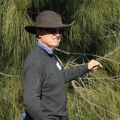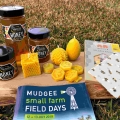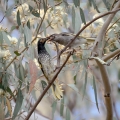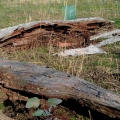Bringing Back Habitat!
Published 213th May 2022. Written by Beth Greenfield
Abundant rainfall has aided in regeneration and recovery in bushfire ravaged areas of our region. While new growth and resprouted trees have greened the landscape, some key habitat features may take several decades to recover.
Countless large, hollow-bearing trees were lost in the fires and Watershed Landcare is currently working on a trial to provide supplementary shelter for hollow dependent native species.
Habitat Innovation and Management director Mick Callan states that “it takes a minimum of 80 to 120 years for a tree hollow to form naturally. Large hollows can take hundreds of years to develop”.
Under the trial, Habitat Innovation and Management have been installing Habitech nest boxes in the Cox’s Creek area. These unique nest boxes are modular, and their entrances can be altered to accommodate a range of potential inhabitants. Watershed Landcare also engaged the company to carry out flora and fauna surveys across several properties in the area. Their findings have helped to customise the nest boxes for local species.
So why are hollows so important? According to Mr Callan, “approximately 300 native species of birds, mammals, reptiles and amphibians use tree hollows in Australia. Twenty-six species of birds and mammals that are hollow dependent are listed as threatened under federal legislation. In NSW alone, 40 species of hollow dependent fauna are threatened under state legislation”.
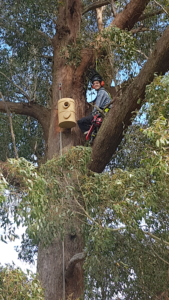
Want to see a practical demonstration of the Habitech nest box installation? Come along to a free workshop on Cox’s Creek Road next Thursday, the 19th of May 2022. This event is an excellent opportunity to learn more about native flora and fauna in the local area and how it is recovering post-fire. Registration is required for catering purposes.
This project is supported by Watershed Landcare through funding from the Australian Government’s Bushfire Recovery for Wildlife and Habitat Community Grants Program.
For more information on the project or to register your interest in the workshop, contact Bethany Greenfield, Project Coordinator, on 0438 090 525 or by email: beth.greenfield@watershedlandcare.com.au



